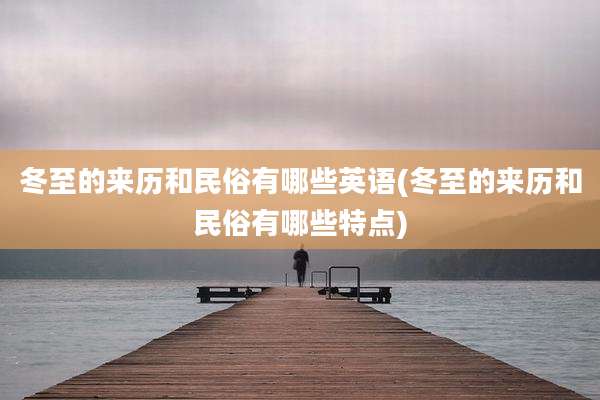Winter Solstice Origin and Customs in English (Characteristics of the Origin and Customs of the Winter Solstice)

The Winter Solstice, known as "Dongzhi" in Chinese, is one of the four solar terms in the Chinese lunar calendar, symbolizing the longest night and shortest day of the year. Here's a detailed explanation of its origin and customs in English, including some of its characteristics:
**Origin:**
The Winter Solstice has a long history in China, stretching back over 3,000 years. It is believed to originate from the Shang Dynasty (c.1600-1046 BCE). The Winter Solstice is marked by the astronomical phenomenon of the sun being at its southernmost position in the sky. This day is associated with the coldest temperatures, hence its name "Dongzhi," which translates to "Extreme Cold."
**Characteristics:**
1. **Agricultural Significance**: The Winter Solstice is considered an auspicious time to perform agricultural activities. It is believed that after this day, the days will start to get longer and warmer, and it is a good time to prepare for spring planting.
2. **Festivity**: It is a public holiday in China, and people often take time to visit family members and friends, similar to the New Year's Day. Celebrations include lighting candles, incense, and fires, which are believed to ward off evil spirits.
3. **Special Foods**:
- **Glutinous Rice Balls**: Also known as "Zongzi," these sticky rice dumplings filled with different fillings, like lotus seeds or sweet red bean paste, are commonly eaten during the Winter Solstice.
- **Tangyuan**: Similar to glutinous rice balls, tangyuan are round glutinous rice dumplings, symbolizing reunion and harmony, and are often eaten in a sweet soy milk broth.
- **Dried Fruits and Nuts**: In northern China, people may eat dried fruits and nuts to ward off illness and ensure health and longevity.
4. **Clothing**: It is believed that wearing a coat made from the fur of a red fox, also known as "hong li," can protect against the cold and bring good luck.
5. **Folk Games**: In ancient times, people played various games to drive away winter's chill, including:
- **Fishing in a Barrel**: A traditional folk game where players take turns trying to "catch" a ball by using chopsticks to lift it from the bottom of a barrel.
- **Dancing around a Fire**: Participants circle around a fire, which is believed to help ward off cold and evil spirits.
6. **Health and Well-being**: The Winter Solstice is also seen as a time for self-care and to protect one's health. It's common for people to take a bath, wear warm clothing, and consume nourishing foods to maintain health during the colder months.
In conclusion, the Winter Solstice is a significant festival in Chinese culture, combining astronomical significance with traditional customs, religious beliefs, and a strong focus on family, health, and prosperity.
「点击下面查看原网页 领取您的八字精批报告☟☟☟☟☟☟」
